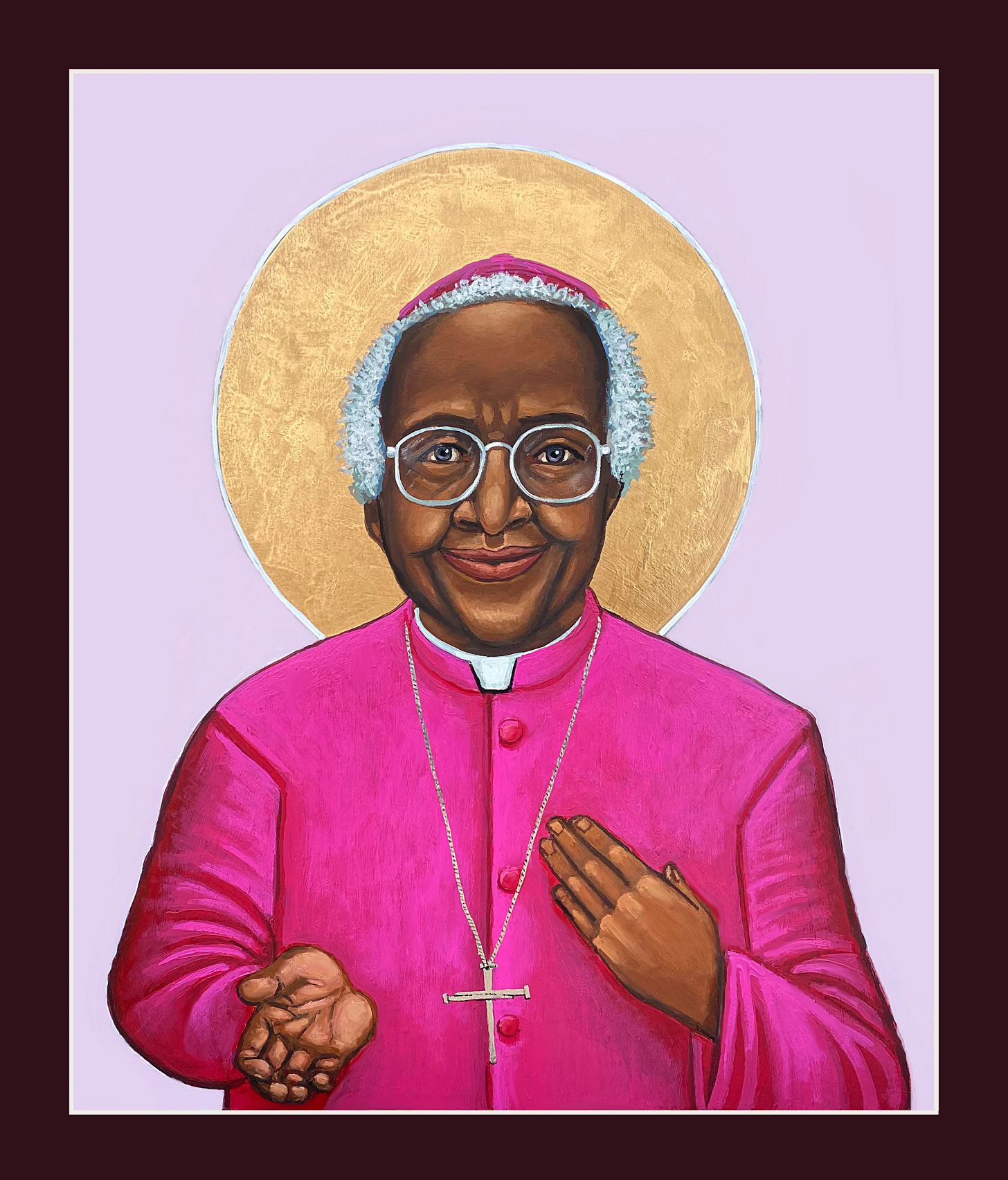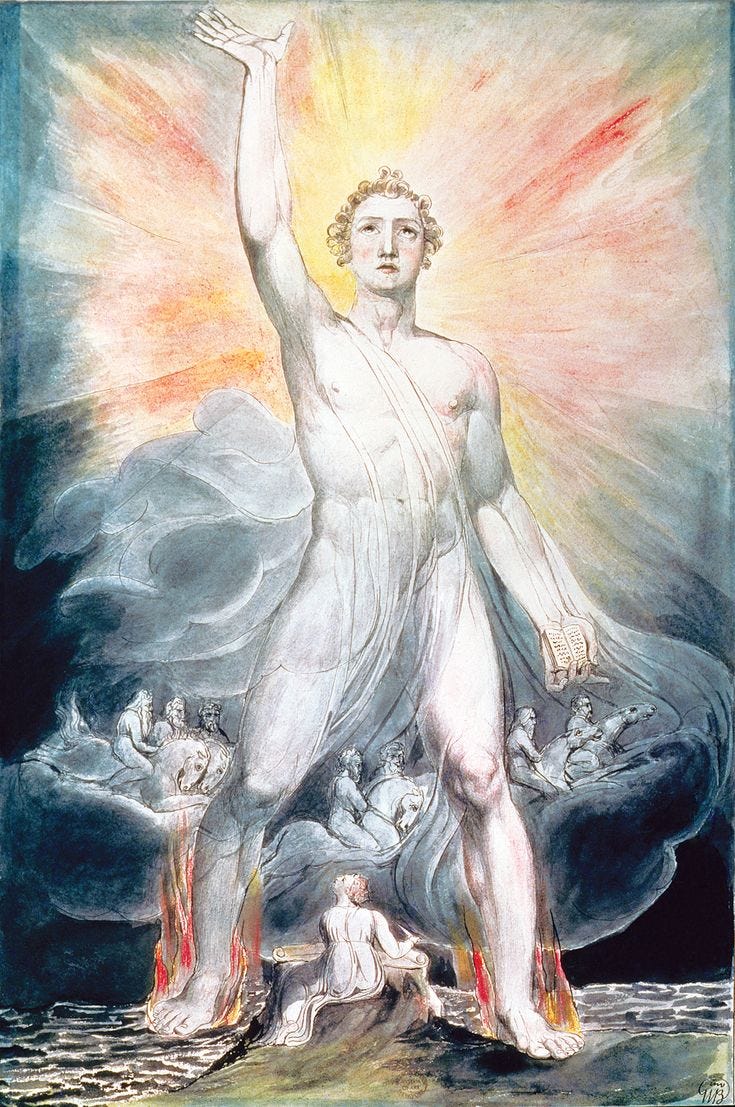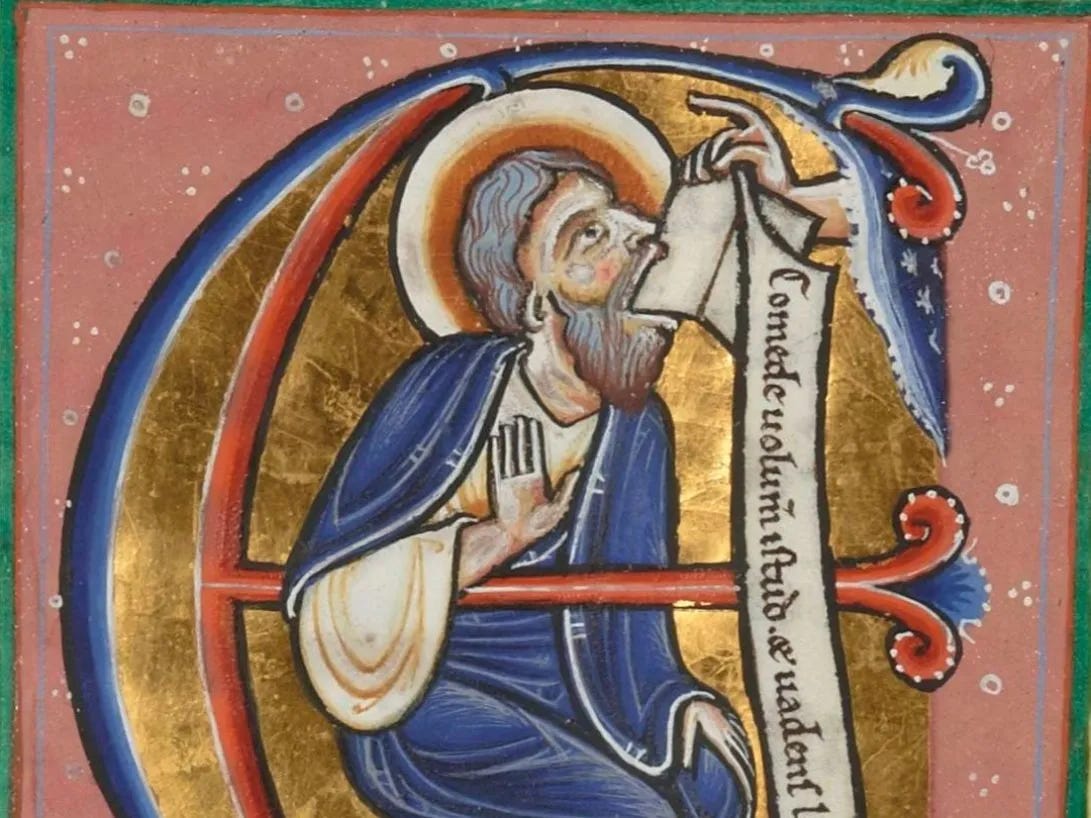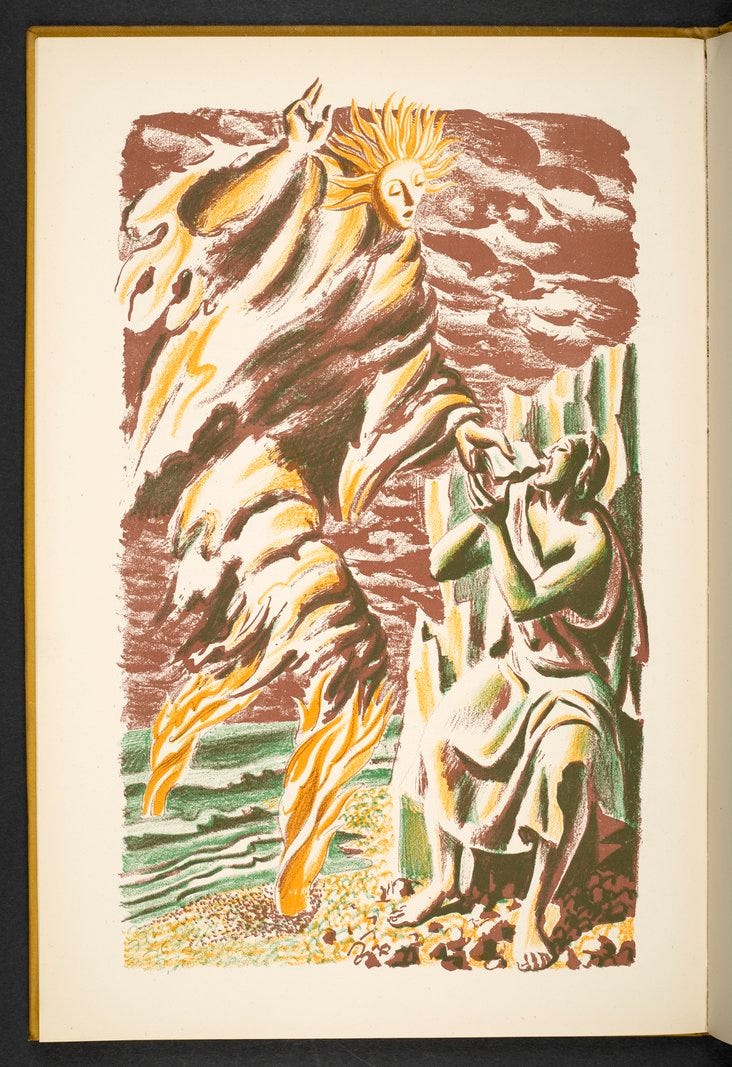Revelation 10.1-11
In the darkest days of apartheid, when no one thought apartheid could ever be dismantled without a bloody revolution, Archbishop Desmond Tutu insisted not only that the God of the Bible— not the Principalities and Powers— sovereignly determines history but that God’s people are how God happens in the world.
On this basis, Tutu dared to live as though he had an invisible army behind him.
On one occasion, the bishop, with a large band of demonstrators and activists, attempted to meet with officials of the South African government.
In the language of the Apocalypse, bishop Tutu prophesied “over many peoples and nations and tongues and kings.”
The black bishop speaking to the white rulers was not permitted, so protestors proceeded to the cathedral where they proceeded to offer a sacrifice of praise and thanksgiving.
At the service of worship, Bishop Tutu preached.
He proclaimed the word of God for the people of God:
“I am a bishop in the Church of God, I am 51 years old, yet I don’t have a vote…Well, they can remove Desmond Tutu. They can end the South African Council of Churches. But the Church of God goes on. The government must know that the Church is not frightened of any earthly power…More are for us than can ever be against us. A vast throng no one could ever count, from every nation and every tribe, standing before the throne and before the Lamb, robed in white and bearing palm branches in their hands, shout together, Victory to our God! We are joined with angels and archangels and the whole company of heaven.”
While Tutu preached, standing ranks of policeman lined the walls of the church, keeping a wary eye on the protest.
Suddenly, in the middle of his sermon, Tutu looked directly at the police— the cops who were determined to keep apartheid in its place by any means necessary— and he declared to them:
“You have already lost! You have already lost! Come over here to us! Join us! Don’t you see, we are inviting you to come and join the winning side! Don’t you understand? It’s the knowledge that in Jesus Christ we have already won that makes our nonviolent witness possible.”
You have already lost!
Indeed, in proclaiming the gospel in the face of apartheid, apartheid was, in fact, already ended.
In the speaking of it, it was already just so.
Or, as the Second Helvetic Confession puts it, “the Preaching of the Word of God is the Word of God.”
Immediately before our text, at the end of the constricting terrors of the trumpet blasts, the earth’s inhabitants appear caught in a self-perpetuating cycle of idolatry and deceit from which, humanly speaking, there is no hope of deliverance. There is no escape from what binds them, the Spirit of Jesus revealed to John. There is no escape because humanity seeks the solution to its plight in the very powers which enslaves them, barren deities and their lies. With the fifth and sixth trumpet blasts, the Seer learned that the world’s liberation from this enslaving cycle of fiction and violence will require nothing less than an act of God.
Nothing that is possible can save us.
And this impossible act, this act of God is surprising.
Take and eat and speak.
At least, this act of God is surprising to anyone whose notions of deity are not shaped by the scriptures.
First, the Seer sees an angel incomprehensible in his almightiness. All the angel’s features echo images already shown to John. Clouds enshroud him. His face shines as the fulfillment of Aaron’s priestly blessing. The rainbow— the sign of the Lord’s pledge to Noah never to destroy his creation again— hangs above his head. Like the Colossus of Rhodes, the angel stands astride land and sea, one foot on the earth and the other foot on the water. Not in the water. Like Jesus before Peter, he stands on the sea.
The artist William Blake rendered the almighty angel as a naked and virile young man who so towers over the prophet he blocks out the sun in the sky. Blake painted a pen in the angel's hand and fire around his feet.
The angel looks like the voice— the angel looks like the voice— that John saw at the beginning of the Apocalypse.
It’s not surprising then that church fathers like Primasius asserted that the almighty angel who appears to John after the fifth and sixth trumpets is none other than “the Lord Christ descending from heaven.”
That this almighty angel of the Lord is the Lord Jesus is not without warrant.
After all, in the Old Testament, nearly six centuries before Mary carries him in the ark of her belly, Ezekiel sees Jesus, the Christ, seated on the cherubim throne, and the prophet promptly receives from the Lord Jesus the same little scroll the angel hands over to the prophet John. According to the Book of Ezekiel, the little scroll announces “that which was from the beginning and that which is destined to be in the End.” That is, the little scroll announces everything, from Alpha to Omega, the all that will be all in all.
On the one hand, the little scroll is overflowing.
Atypically, the scroll handed over to Ezekiel and John both bears writing on both its sides, front and back. You do not write on both sides if you have to roll it up. But for this scroll, there is no white space. It’s packed to the margins, as though there is no end to what could be said about what must be said.
In other words, the implications of the promise are plenitudinous.
On the other hand, the overflowing scroll is little.
The Lord Jesus instructs John not to write down everything he sees and hears. “The thunders spoke in their voices,” John reports. “Do not write that down,” the angel— Jesus— implores the prophet, as though not everything we could say about God is what must be said for God.
In other words, its implications might be plentiful— infinite, in fact— nevertheless the promise is precisely particular.
As Calvin’s Geneva Bible notes, the little scroll is “the Gospel of Christ, which the Antichrist cannot hide, seeing Christ bringeth it open in his hand.”
Thus, the scroll is not all of scripture. The scroll is little. The scroll is the gospel. And it is a little word. Any way you put it, it makes for a meager sentence.
Christ is risen.
Done for you.
Jesus is Lord.
You have already lost!
Your sins are forgiven.
Jesus lives with death behind him.
Because he lives, so shall you live.
You are justified in Christ alone, by grace alone, through faith alone.
Apart from works!
Any way you put it, it is a small word. It may prove a stumbling block; you may choke on it. But it is sufficiently small to swallow.
The angel of the Lord who is the Lord Jesus beckons the prophet to take this little word (for you— that’s as small as I can make it), and feed on it and then serve it up for the peoples and the nations and the kings.
Once again, with the fifth and sixth trumpet blasts, at the end of the ninth chapter of the Apocalypse, John sees that the world has no hope apart from a direct intervention by God.
Just what is that surprising, miraculous, gratuitous act of God?
The Risen Jesus appears to John in glory.
And he hands over the goods, the little word of the gospel in which he gives himself.
“Eat me,” he commands, “And go and speak.”
I heard Jim Nestingen lecture on the gospel at an event years ago, and during his presentation he shared a story about how he’d been traveling long hours and many miles from conference to conference.
“As the plane was taking off,” he said, “the guy sitting next to me asked what I did for a living. I said to him, “I’m a preacher of the gospel.” Almost as soon as I got the words out, he shouted back at me, “I’m not a believer!”
“But the man was curious,” Jim said in his presentation:
“Once we got to cruising altitude, he started asking me about being a preacher. After a bit, he started telling me stories about the Vietnam War. He’d been an infantryman in the war. And he’d fought at all the awful battles and done the terrible things his country required of him. This went on the whole flight, from coast to coast, him giving over to me all the awful things he’d done. As the flight was about finished, I asked him. I said to him, “Have you confessed all the sins now that have been troubling you?”
“What do you mean confessed?! I’ve never confessed” the man replied.
“You’ve been confessing your sins to me this whole flight long. And I’ve been commanded by Christ Jesus that when I hear a confession like that to hand over the goods I’ve received and speak a particular word to you. So, you have any more sins burdening you? If so, throw them in there.”
“I’m done now,” the man next to him said, “I’m finished.”
“So I unbuckled my seatbelt and I unsqueezed myself from my chair,” Nestingen said, “and I stood up. The stewardess then— she starts yelling and fussing at me, “Sir— SIR— you can’t do that. Sit down. You can’t do that.”"
“Can’t do it?” I said to the stewardess. “Ma’am Christ our Lord commands me to do it.”
“And she looked back at me, scared, like she was afraid I was going to evangelize her or something. So I turned back to the man next to me and, standing up over him, I put my hand on his head and I said, “In the name of Jesus Christ and by his authority, I declare the entire forgiveness of all your sins.””
“You— you can’t do that.”
He whispered to me.
“I can do it. I must. Christ compels me to do it, and I just did it and I’ll do it again.”
“So I gave him the goods again. I tipped his head back and I spoke faith into him, and I did it loud for everyone on that plane to hear it. And just like that,” Nestingen said, “the man started sobbing… like somebody had stuck him. Soon his shirt was wet from all his weeping and I held him in my arms like I’d hold a child.”
After the guy stopped weeping, he laughed and wiped his eyes and he said to me, “Gosh, if that’s true, it’s the best news I’ve ever heard.”
When I thought the story was over, Jim started to cry all over again and he said, “After the plane had landed, I handed my business card to him. I told him, “If you get hungry for that word in the future, call me and I’ll hand it over all over again.”
And then Jim laughed a big, deep laugh and said:
“Wouldn’t you know it. He called me every day— every day— just for me to serve up the little word of the gospel to him. So I did, every day until he died— I wanted the last words he heard in this life to be the first words he would hear Jesus himself say to him in the next life. That way, in the future he will discover he’d already met Jesus in his past— he got him in his word.”
At the Lord’s command, John, like Ezekiel before him, eat the little scroll and, just so, God commissions them as prophets.
Before you conclude that this “drastic sacramental reception” does not also apply to you, remember that, according to Acts 2.16-18, the entire church, and so also Israel, is a single prophetic community.
This commission holds for us as much as it applies to John or Ezekiel; consequently, this passage “sets us deep within the mystery of history” and it forces us to repent of our pagan misapprehensions about the reality of the true God.
The true God is triune.
The true God is Father, Son, and Holy Spirit.
God is Father, Jesus, and Holy Spirit.
And Jesus is the word made flesh.
Jesus just is a word with body and blood.
And because Jesus, as the creed attests, is “of one being with the Father,” the Father and the Spirit are likewise words.
As the theologian Peter Brunner writes:
“In view [of God’s triune nature]…we must abandon all pictures of God that with the help of Plato’s mode of thought read into God a fixed, unmovable, and abstract perfection.”
According to the rule of faith, the doctrine of the Trinity demands two primary propositions.
Firstly, God is an event.
God is not a static being. God is no more Aristotle’s Unmoved Mover than God is the Man Upstairs.
Nor is God a timeless, ineffable mystery far beyond in a reality to which the Bible can only point.
God is an event.
The kind of reality God has is like that of a kiss or a car accident or water washing over a child.
As Jason Isbell sings, “You thought God was an architect, now you know/He’s something like a pipe bomb ready to blow.” “24 Frames” is more theologically precise than “Immortal, Invisible, God Only Wise.”
According to the rule of faith, that God’s proper name is Trinity demands a second proposition; specifically, God is a particular sort of event, a verbal event.
God is discourse, an exchange not a lecture.
Conversation, address and reply, call and response.
The Lord is his loquaciousness.
As Robert Jenson writes,
“It was the first deliberate dogma of Christianity, by which the faith forever defined its difference from other religions, that with Christianity’s God there is no silence from eternity, that we do not lose our voice and ears as we approach him, that he not only has a word for us— which is eccentric enough in the world of religion— but is his word for us…
The conversation that is God is not a conversation in heaven— at least, if by heaven we mean some other place than earth. The conversation that is God is the proclamation of the law and the gospel. Wherever human discourse occurs which opens human life to the last future, there is the occurrence of God.”
As mind-bending and mysterious as all this may sound, it is the plain teaching of Jesus, “Wherever two or three are gathered together in my name, there I am in the midst of them.”
It’s astonishing indeed but this teaching so saturates Christianity we seldom notice it. Paul puts it straightforwardly at the top of his letter to the Romans, “For I am not ashamed of the gospel. It is God at work [in the world.” This is why she who will be Jesus’s spouse, the church, is simultaneously also his body. The church is the body of the Risen Jesus precisely because the church is the location of the verbal event that is God. This is why, for example, to ask whether the water or the bread and the wine are just symbols misunderstands not only baptism and communion but misunderstands the reality that is God.
God is his word for us.
Thus, the verbal event that is God necessarily includes us.
Again, as mind bending and mysterious as this may strikes us, it is the straightforward teaching of Jesus, who commanded that we pray to his Father as our Father.
He listens to us.
Exactly because the Father loves the Son, he listens to his Son’s bride.
And this is the way in which our passage forces not only to repent of our pagan notions of God but also sets us deep within the mystery of history.
That Jesus is a word with a body and blood, that God is a colloquy that includes us means that the prophetic community’s prayers and praise and proclamation are the events by which God happens in history.
Make no mistake, this means nothing less than that God sovereignly determines history but that God determines history not by arbitrary decisions in heaven but by deliberating with us. “Go and preach to the nations and kings,” the Lord commissions John; just so, history.
God determines history by listening to us about how that history should go.
This means not only that God is responsible for the history he makes but also that God is on the hook— morally speaking— for choosing such unreliable partners as people like us.
Hence Martin Luther’s forthright maxim:
“If we look at how God governs history and judge by any standard known to us, then we must conclude either God is wicked or God is not.”
But any understanding of how God happens in the world that does not produce something like Luther’s maxim is not the claim made by the scriptures. As Jenson puts it in frank either/or terms,
Either prayer and praise and proclamation are absurd.
Or they are “nothing less than our permitted mixing into the triune deliberation we call providence.”
By our baptisms, we are invited to address God as the spouse of his Son, we are invited to offer opinions as to how he run his affairs, and we are invited even to speak for him in such a way that our speech for him is him.
At the end of his story, as Jim Nestingen recalled his coast-to-coast flight, he started to weep.
He remembered the reaction of the passengers and crew as he handed over the goods.
He said:
“The stewardess and all the rest who’d been freaking out and fussing at me for standing up on the plane— when I handed over the goods to the guy, they all stopped and became as silent as dead men. They knew something more important was happening right in front of them— something more important. This man’s life was breaking open. The Future was intruding upon his past. The old world was being unmade. Jesus Christ was raising this man from the dead right in front of them, and even if they didn’t know it to put it that way, they knew that they were seeing God in front of their eyes.”
You’ve already encountered him in water.
You’re about to eat him in creatures of bread and wine.
So, dare to trust and believe: That I offer you these words in the name of the Father, Son, and Holy Spirit and that you receive them saying amen, here— right now, graciously so— is our God.




















Share this post